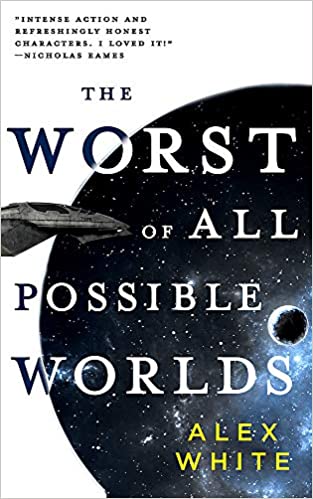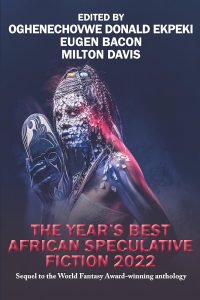Liz Bourke Reviews The Worst of All Possible Worlds by Alex White
 The Worst of All Possible Worlds, Alex White (Orbit 978-0-316-41214-8, $16.99, 544pp, tp) July 2020.
The Worst of All Possible Worlds, Alex White (Orbit 978-0-316-41214-8, $16.99, 544pp, tp) July 2020.
Alex White’s The Worst of All Possible Worlds is the ”what happens next” for their Salvagers trilogy. The final volume in this high-stakes, high-octane space-opera-with-magic series, it sees the crew of the Capricious in a final showdown with the so-called gods of the Harrow for the fate of the universe, and it reminds me of nothing so much as Mass Effect 3.
The Salvagers trilogy started with A Big Ship at the Edge of the Galaxy, which introduced a universe where the vast majority of people are able to do (wildly differing kinds of) magic, and where an interstellar human civilisation enjoys faster-than-light travel and a multitude of polities that cooperate and compete. Most of the main characters of the trilogy, including treasure hunter/historian/fighter pilot Boots Ellsworth, are survivors of a war that only ended after their planet became uninhabitable. In A Big Ship at the Edge of the Galaxy, the crew of the Capricious – and hotshot racing driver Nilah Brio, who falls into their company – uncover a decades-old conspiracy by people who have achieved godlike magic powers, a conspiracy that killed a planet and could kill many more. A Bad Deal for the Whole Galaxy saw the Capricious crew (now including Nilah, who has become engaged to Orma, the Capricious‘s competitive, talented engineer – she’s much more strongly inclined than Nilah to solve her interpersonal problems with a knife) get in even deeper when it comes to chasing leads and rooting out contributors to the conspiracy, through capers, violence, and skullduggery.
The Worst of All Possible Worlds opens with an execution. Its climax is a showdown on a lost planet. Along the way there’s at least one major fleet action, numerous punch-ups, some spycraft, really aggressive and destructive archaeology, and the kidnapping of a child who’s a reincarnated secret agent. Did I mention that it’s batshit fun, and introduces a whole new conspiracy? This one’s ancient, and has to do with the power that Witts, the leader of the gods of Harrow, has been seeking for more than a century: the power of alchemy, a magic so great that its originators decided that humanity couldn’t be trusted with it, and hid it away, protecting it with reincarnating secret agents willing to wipe out whole civilisations.
For the crew of the Capricious, there are also personal dangers, developments, and losses. These focus on Boots and Nilah, as the only viewpoint characters, but through their eyes we also see the strengths and weaknesses of Captain Cordell, ship’s doctor turned second-in-command Malik Jain, pilot Aisha Jain, and the mind-reading brother-sister duo of Alistair and Jeannie, bred as weapons – as well as Orma, Nilah’s brusque and unromantic, but fierce and dedicated, fiancé. Boots remains much as ever, an outsider who is nonetheless an important part of the crew. Nilah’s race-driver arrogance has been a little tempered by experience, but grief strikes her – and drives her to extremes of violence – when enemies kidnap her father and kill him horribly, a death that is recorded and which Nilah witnesses far too late to be able to change. That death drives her to want revenge, and to act in ways that, until she gets a grip on herself, put her and her crewmates at risk.
A hectic race to find (and steal) some information is followed by a massive fleet action – in which our heroes’ allies are badly defeated, and our heroes barely escape with their lives. Cut loose from support and with no resources but what they bring with them, the crew of the Capricious tracks down the places revealed by the information they acquired – and trade for the tools they need to penetrate the secrets hidden there. Discovering layers of secret conspiracies, things long thought mythical, and the lost planet of Origin, they need to pull off all manner of fancy footwork to survive and to triumph – and to have their revenge on Witts and the gods of the Harrow.
I said that The Worst of All Possible Worlds feels like Mass Effect. That’s less in its characterisation or worldbuilding than in its structure and, to some degree, in its emotional tone. A small band of misfit paramilitary heroes dash here and there, accomplishing missions and uncovering information that build towards a climactic showdown with the fate of everything at stake, and a very visual bam-pow pell-mell approach to action scenes? There are similarities, and that’s not in the least a complaint. But apart from Boots, Nilah, and Orma, White’s characterisation feels pretty slight, and the frenetic pace leaves very little time for thematic argument or emotional weight.
The Worst of All Possible Worlds is an action-packed hustle of a novel, with a sense of humour and a keen eye for the ridiculous. It’s not deep or terribly meaningful, but it is cracking good fun.
Liz Bourke is a cranky queer person who reads books. She holds a Ph.D in Classics from Trinity College, Dublin. Her first book, Sleeping With Monsters, a collection of reviews and criticism, is out now from Aqueduct Press. Find her at her blog, her Patreon, or Twitter. She supports the work of the Irish Refugee Council and the Abortion Rights Campaign.
This review and more like it in the July 2020 issue of Locus.
 While you are here, please take a moment to support Locus with a one-time or recurring donation. We rely on reader donations to keep the magazine and site going, and would like to keep the site paywall free, but WE NEED YOUR FINANCIAL SUPPORT to continue quality coverage of the science fiction and fantasy field.
While you are here, please take a moment to support Locus with a one-time or recurring donation. We rely on reader donations to keep the magazine and site going, and would like to keep the site paywall free, but WE NEED YOUR FINANCIAL SUPPORT to continue quality coverage of the science fiction and fantasy field.







